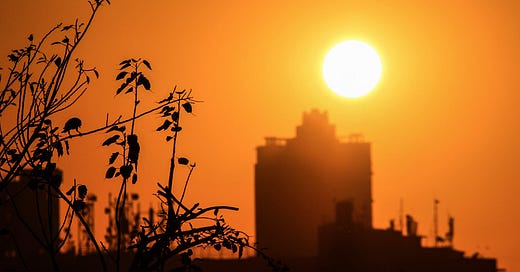When the sun shines on both sides of the hedge
Which of the UK's many region-specific words to describe sunny weather are most familiar to you?
For centuries, how we describe the weather has depended partly on where we live.
That was the starting point for my book 100 Words for Rain which came out almost exactly a year ago, published by the National Trust. So for example, in Nottingham you might refer to a ‘Goose Fair morning’ to describe that slightly nippy time of the year in early autumn (the city’s Goose Fair has been held in late September and early October for hundreds of years).
Some terms are very localised, others are likely to be used in more rural areas than urban ones, such as a ‘Blackthorn winter’ (cold weather with dry winds in March/April, the time when blackthorn flowers, the opposite of an ‘Indian summer’)
And the very nature of language means that terms are not limited by precise country boundaries which of course themselves have changed over the years – you could describe it being so hot on a sunny day that it is ‘splitting the trees’ in Cumbria, the North East, or Scotland. And if you’re enjoying a ‘weather-breeder’ you could be enjoying the fine weather of Yorkshire, Lincolnshire, or East Anglia.
Bearing all that in mind, here is a selection of regional weather words, phrases, and sayings featured in my book related to sun and sunshine recorded in the last 200 years around England.
Berkshire
What be good for the hay be bad for the turmuts – what’s ideal weather for making hay (sun) is not great for growing turnips (rain)
Grawin - showers and sunshine, alternating
Cornwall
Quilstering – overpoweringly hot
Cumbria
Swelt – when it’s overwhelmingly hot
Essex
Following time – when rain showers and sunshine alternate
Lincolnshire
Gleamy – when it’s interchangeably sunny and rainy, or two other kinds of different weathers
West Midlands
As red as the rising sun at Bromford - an old Warwickshire saying
When the sun shines on both sides of the hedge - i. e. never
Yorkshire
Blikken – sunshine
Summer-colt – rippling haze near the ground on a hot day
The book also looks at various ways in which weather affects our behaviour. There’s more details of this in the book, but just to sum up a few examples about what a bit of sun can do:
a YouGov survey showed most people said sunny days made them happier, but a minority complained that they could be draining and made them irritable
researchers at the Institute of Psychiatry in London indicates that hot weather increases the risk of suicide
the National Trust reports that visitor numbers to its properties peak at 24ºC – when it gets hotter than this, visitor numbers gradually drop until they reach 28ºC when they fall substantially
Tescos data reveals that a 4°C rise in temperature means slightly more than a 40% leap in sales of burgers, and when it’s hot at the weekend, green vegetable sales take a hit
while we eat more ice cream when it’s hot, sales actually plateau at about 25°C in the south of Britain at which point people switch to frozen lollies
exposure to sunlight makes us more likely to spend more in shops
there is a small but significant negative link between job satisfaction and sunshine i.e. we are less happy with our jobs on sunny days
serious crimes (physical assault, mob violence, domestic violence, rape) tend to increase as the temperature rises, up to around 29°C - when it gets above this figure, levels of violence drop again





